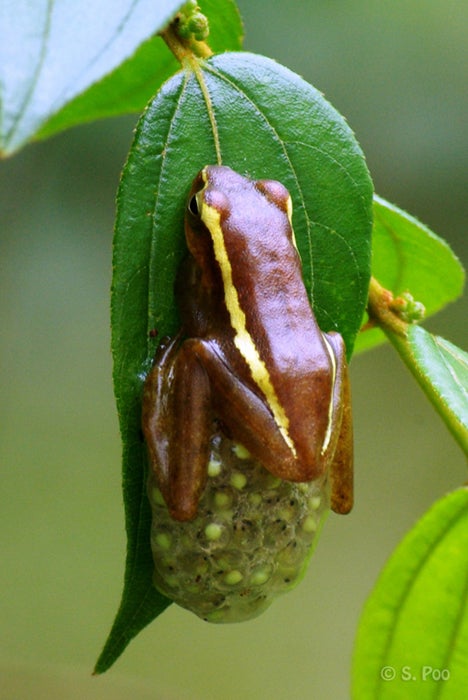Unusual parenting in a Southeast Asian species of treefrog
David BICKFORD (Group Leader, Biological Sciences) () May 30, 201430 May 2014. Chiromantis hansenae has been discovered to practice parental care to increase the likelihood of survival of its offspring.
Professor David Bickford and his team from the Department of Biological Sciences NUS have discovered that a Southeast Asian species of treefrog practices parental care to increase the likelihood of survival of its offspring. Chiromantis hansenae (C. hansenae) is currently the only species in the treefrog family in Southeast Asia that is known to exhibit such behaviour. It is the first systematic observational and experimental study that shows the benefits to the offspring as a result of parental care in a Southeast Asian amphibian. Previous reports of parental care in amphibians in the region were purely observational.
The researchers found that although C. hansenae breeds very close to water sources, there is still an extremely high risk of the eggs drying out, a process called egg desiccation. By comparing the offspring survival between natural egg masses and egg masses where parent frogs were experimentally removed, they determined that the behaviour of the parent is essential to the survival of their offspring (see Figure). The researchers made these findings after conducting a total of 1,448 field observations of the 126 egg masses over two years, from July 2011 to October 2012.
The study is timely as C. hansenae is listed as Data Deficient under the International Union for Conservation of Nature’s Red List of Threatened Species. The research contributes to better understanding of this species, and highlights the richness of the biodiversity in our region, where very little is known about the life history and behavior of most species. This work has been recently published as the cover story in a popular magazine of nature and science, Natural History.

Picture of a female treefrog, Chiromantis hansenae, covering the egg mass with her body as a form of parental care, known as egg attendance. (Photo credit: POO Sinlan)


